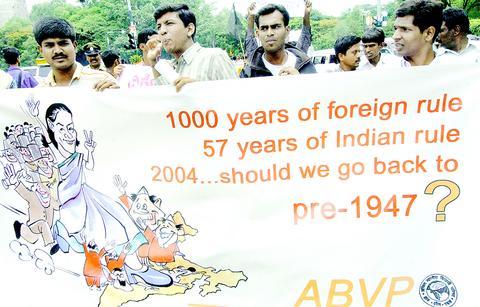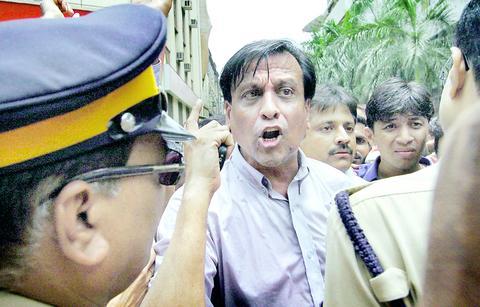Indian prime minster-elect Sonia Gandhi faced her first crisis yesterday, before even taking power, when pivotal leftists refused to formally join her government and markets crashed on fears over economic policy.
Shares on the Bombay exchange plunged almost 16 percent -- the worst fall in its 129 years -- before trading was suspended a second time. They later recovered to about 9 percent down, on top of heavy losses last week. The rupee also fell 0.8 percent yesterday despite central bank support.

PHOTO: AFP
The crash, including a big drop on Friday, has wiped billions of dollars off the value of India's listed companies. Hundreds of bro-kers and small investors protested outside the bourse on the day Gandhi was due to visit the president to claim power.

PHOTO:AFP
Leftist parties, which hold more than 60 of the new parliament's 545 seats, decided not to formally join Gandhi's Congress party and its allies in the coalition expected to be sworn in tomorrow. They have pledged to support her from outside on vital votes, such as confidence motions, but the decision has stoked concerns about the government's stability and fears the communists will wield their power without responsibility.
"The whole tug-of-war is economic policy. Either the left should be in the government and take responsibility for implementing those policies or they should give unconditional support if they are supporting from outside," said a trader with a leading brokerage in Mumbai.
"It makes no sense to remain outside and then dictate terms. Outside support will make the government that much more unstable," the broker said.
But Congress spokesman Jaipal Reddy said: "There are no doubts about stability of this government. There will be no difficulty."
Investors fear the leftists, led by the Communist Party of India (Marxist), the third largest party in the parliament with 43 seats, will block or slow key reforms in Asia's third largest economy, especially privatization of bloated state firms.
Senior Congress leader Manmohan Singh, the father of India's economic reforms more than a decade ago, stepped in quickly to reassure investors.
"We are not pursuing privatization as an ideology, but we are not against privatization where it is called for in the national interest," he told reporters. "Our fiscal and other policies will seek to create a favorable climate for enterprise."
But at exactly the same time, just a few kilometers from where Singh was speaking, communist leaders were calling for increased subsidies for farmers, the return of some import restrictions and the axing of the privatization ministry.
However, Communist Party of India leader A.B. Bardhan also said the parties would support some stake sales in government firms and welcomed foreign investment.
Analyst Prem Shankar Jha said the power of the communists after Congress' surprise ouster of the ruling Hindu nationalist-led coalition could take India back to the instability of the mid-1990s when leftists were also pivotal.
"By staying out, the communists will be free to criticize anything the Congress does. This will constantly erode the confidence in the government," he said.
The Italian-born Gandhi was expected to visit President Abdul Kalam to claim power yesterday, armed with letters of support totalling more than 320 seats. That includes the leftist bloc.
If Kalam agrees, her new government is due to be sworn in tomorrow, making her India's first foreign-born prime minister and the dynasty's fourth.

Indonesia yesterday began enforcing its newly ratified penal code, replacing a Dutch-era criminal law that had governed the country for more than 80 years and marking a major shift in its legal landscape. Since proclaiming independence in 1945, the Southeast Asian country had continued to operate under a colonial framework widely criticized as outdated and misaligned with Indonesia’s social values. Efforts to revise the code stalled for decades as lawmakers debated how to balance human rights, religious norms and local traditions in the world’s most populous Muslim-majority nation. The 345-page Indonesian Penal Code, known as the KUHP, was passed in 2022. It

‘DISRESPECTFUL’: Katie Miller, the wife of Trump’s most influential adviser, drew ire by posting an image of Greenland in the colors of the US flag, captioning it ‘SOON’ US President Donald Trump on Sunday doubled down on his claim that Greenland should become part of the US, despite calls by the Danish prime minister to stop “threatening” the territory. Washington’s military intervention in Venezuela has reignited fears for Greenland, which Trump has repeatedly said he wants to annex, given its strategic location in the arctic. While aboard Air Force One en route to Washington, Trump reiterated the goal. “We need Greenland from the standpoint of national security, and Denmark is not going to be able to do it,” he said in response to a reporter’s question. “We’ll worry about Greenland in

PERILOUS JOURNEY: Over just a matter of days last month, about 1,600 Afghans who were at risk of perishing due to the cold weather were rescued in the mountains Habibullah set off from his home in western Afghanistan determined to find work in Iran, only for the 15-year-old to freeze to death while walking across the mountainous frontier. “He was forced to go, to bring food for the family,” his mother, Mah Jan, said at her mud home in Ghunjan village. “We have no food to eat, we have no clothes to wear. The house in which I live has no electricity, no water. I have no proper window, nothing to burn for heating,” she added, clutching a photograph of her son. Habibullah was one of at least 18 migrants who died

Russia early yesterday bombarded Ukraine, killing two people in the Kyiv region, authorities said on the eve of a diplomatic summit in France. A nationwide siren was issued just after midnight, while Ukraine’s military said air defenses were operating in several places. In the capital, a private medical facility caught fire as a result of the Russian strikes, killing one person and wounding three others, the State Emergency Service of Kyiv said. It released images of rescuers removing people on stretchers from a gutted building. Another pre-dawn attack on the neighboring city of Fastiv killed one man in his 70s, Kyiv Governor Mykola